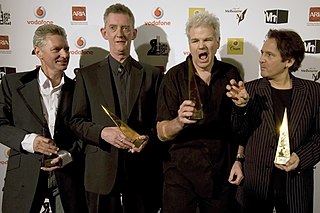
Dragon is a New Zealand rock band which was formed in Auckland in January 1972, and, from 1975, based in Sydney, New South Wales, Australia. The band was originally fronted by singer Graeme Collins, but rose to fame with singer Marc Hunter and is currently led by his brother, bass player and co-founder Todd Hunter. The group performed, and released material, under the name Hunter in Europe and the United States during 1987.
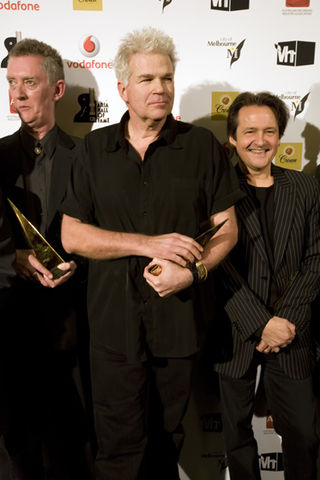
Todd Stuart Hunter is a New Zealand musician and composer known for his involvement in the band Dragon. Their best known songs are "April Sun in Cuba", "Are You Old Enough?", "Still in Love With You", and "Rain". Hunter also composed John Farnham's hit song "Age of Reason" with Johanna Pigott and music for film Daydream Believer (1991) and TV series Heartbreak High (1994–1999).
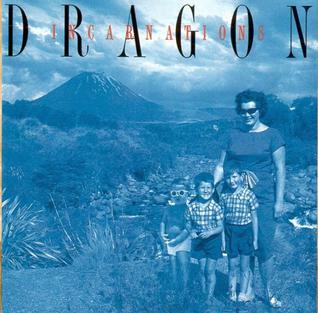
Incarnations is the tenth studio album by New Zealand-Australian band, Dragon. The album was released in 1995. and is an acoustic album of their previously released material. It was their final studio album for eleven years, their last before their second split in 1997 and their last to feature Marc Hunter before his death in 1998.
Marc Alexander Hunter was a New Zealand rock and pop singer, songwriter and record producer. He was the lead vocalist of Dragon, a band formed by his older brother, Todd Hunter, in Auckland in January 1972. They relocated to Sydney in May 1975. He was also a member of the Party Boys in 1985. For his solo career he issued five studio albums, Fiji Bitter, Big City Talk, Communication, Night and Day and Talk to Strangers. During the 1970s Hunter developed heroin and alcohol addictions and was incarcerated at Mt Eden Prison in Auckland in 1978. He was recklessly outspoken and volatile on-stage. In November 1978, during the band's American tour, supporting Johnny Winter, they performed in Dallas, Texas, where "he made some general stage observations about redneck buddies, illegal oral sex and utility trucks" and called the audience members "faggots". Upon his return to Australia, in February 1979, he was fired from the group by his brother, Todd.
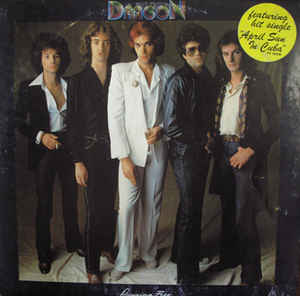
Running Free is the fourth studio album by New Zealand rock band Dragon. It was produced by Peter Dawkins and was originally released in November 1977 on vinyl and re-released on CD in 1989. The album peaked at number 6 on the Australian Kent Music Report. The album was certified triple platinum in Australia.

Snake Eyes on the Paradise Greatest Hits 1976–1989 is a compilation album by rock music group, Dragon, released in 1998. This is the single disc version - there is also a two-disc version called Tales from the Dark Side Greatest Hits and Choice Collectables 1974–1997, which has this disc plus a second disc of album tracks, live, b-sides and other rarities. The album charted at number 70 on the ARIA Charts.

Tales from the Dark Side Greatest Hits and Classic Collectables 1974–1997 is a compilation album by rock music group, Dragon, released in August 1998. Disc one has the same track listing as Snake Eyes on the Paradise Greatest Hits 1976–1989, which was issued in the same year. Disc two consists of album tracks, live, b-sides and other rarities.

Body and the Beat is the seventh studio album recorded by Australian-New Zealand rock band, Dragon. The album was released in June 1984 and peaked at number 5 on the Australian Kent Music Report. The album was certified gold in the week of release and achieved platinum status in Australia. It was the band's first studio album since Power Play in 1979.

Dreams of Ordinary Men is the eighth studio album recorded by Australian-New Zealand rock band Dragon. The album was released in August 1986 and peaked at number 18 on the Australian Kent Music Report and was certified platinum in November 1986.

"Rain" is a song by New Zealand rock group Dragon released in July 1983 as the first single ahead of their seventh studio album, Body and the Beat. It is co-written by the group's brothers, Marc and Todd Hunter, with Johanna Pigott, Todd's then-domestic partner. "Rain" peaked at number 2 and stayed in the Kent Music Report singles chart for 26 weeks. The song reached number 88 on the United States Billboard Hot 100 charts in mid-1984. For the original single version the group's Kerry Jacobson had provided drums and percussion; he left the group in September 1983 and was replaced by Terry Chambers, who is shown in promotional material including cover art and music videos.

"Young Years" is a song by New Zealand group Dragon, released on 3 April 1989 as the second single to be released from the group's ninth studio album Bondi Road (1989). "Young Years" peaked at No. 18 on the ARIA charts and No. 13 on the Recorded Music NZ chart, their final top 40 hit to date.
"Dreams of Ordinary Men" is a song by New Zealand-Australian rock band Dragon released in August 1986 as the second single from the group's eighth studio album Dreams of Ordinary Men (1986). The song peaked at number 17 on the Australian Kent Music Report.

"River" is a song by New Zealand-Australian rock band Dragon, released in May 1988. It was released as a non-album single but later appeared on Dragon's compilation album, Snake Eyes on the Paradise Greatest Hits 1976–1989. The song peaked at number 81 on the Australian ARIA Singles Chart.

"Cry" is a song by the New Zealand-Australian rock band Dragon, released in May 1984 as the third single from the group's seventh studio album Body and the Beat (1984). The song peaked at number 17 on the Australian Kent Music Report.

Live One is the first live album by Australian-New Zealand rock band Dragon. The album was recorded on 10 August 1984 at the Sydney Entertainment Centre during the promotion of the Body and the Beat album. Live One was released in June 1985 and peaked at number 62 on the Australian Kent Music Report.
Scribble were a post punk synth pop band based around Johanna Pigott on lead vocals, guitar, piano and keyboards, which she formed in 1983. She was joined by her domestic partner, Todd Hunter, on bass guitar and keyboards, and session musicians. They released two albums, So Far 1983-1985 and Pop Art (mid-1986). Scribble disbanded in 1987 with Pigott focussing on her song writing.
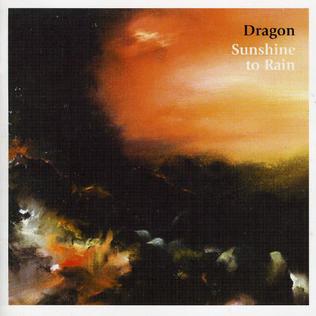
Sunshine to Rain is the eleventh studio album by New Zealand-Australian band, Dragon. The band reformed featuring Mark Williams on vocals. The album was released on 27 June 2006 and is their first since 1995's Incarnations. The album debuted and peaked at number 87 on the ARIA Charts. The album release was followed with a tour.

So Far is a compilation album by New Zealand group Dragon, released in January 1988 through J&B Records, under licence from CBS Records and PolyGram Records. The album was released as the band's cover version of Kool & The Gang's "Celebration" was in the top 20 in Australia, on the RCA Records label.

"Summer" is a song by Australian-New Zealand group Dragon, released on 18 September 1989 as the fourth single to be released from the group's ninth studio album Bondi Road (1989). "Summer" peaked at No. 57 on the ARIA charts.

Cuts from the Tough Times is a compilation album by New Zealand group Dragon, released in January 1990 through Polydor Records. The album comprised all the tracks from their 1984 album, "Body and the Beat" and a selection of tracks from their 1986 album, "Dreams of Ordinary Men". The album has been re-released numerous times.

















